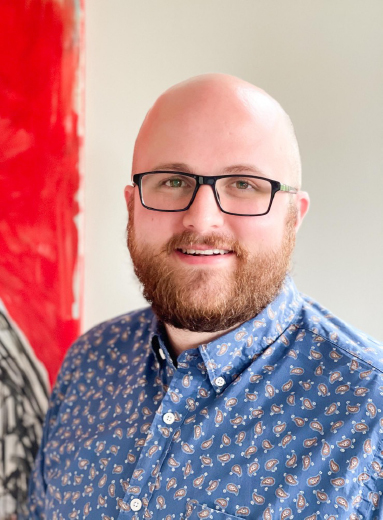Tyler Bennett is a cis-gendered gay man and Berkeley City College (BCC) student transferring to UC Berkeley, Fall 2021, majoring in Social Welfare/Public Health.
Tyler grew up in two northeast Ohio counties spending formative years at the edge of Appalachia and adolescence in a “football” town. His personal struggles throughout school provided the impetus for his desire to help others face their own challenges while holding positions at Alameda County Behavioral Health (ACBH).
As a youth, intergenerational and personal family trauma created a difficult home environment for Tyler. Increased instability, discovery of his queer identity, and lack of social support left him with internalized feelings of responsibility for events outside his control. Emergence into adulthood and his desire for a higher education were marred by unresolved mental trauma.
After dropping out Tyler returned home to forge his path through the community college system. The pursuit of personal growth reversed the negative effects of his teens and twenties. Reentrance to college created new stressors and he grappled with failure induced shame, all while balancing life (work, relationships, physical/mental health needs) and studies. Through adversity his education took on an entirely new meaning as he determined how his education would lead to success. Tyler vigorously dove head-on into opportunities that supplemented his knowledge, making the benefits of further pursuing his education a reality.
Tyler gained experience on long term projects and performing essential tasks under the mentorship and expertise of Melina Winterton and Janine Greer (Directors). To his credit, he has earned and/or performed duties associated with the following positions: Tech Liaison; Mental Health Navigator; Embedded Tutor since 2019 for the Health & Human Services Certificate Program; Guided Pathways: Resource Access Project; Founder, Sex Education Club; Volunteer/Trainer at San Francisco Suicide Prevention, and Coordinator/Lead Facilitator for his passion project Success Incubator.
The Success Incubator addresses issues of non-traditional students. The support group, women of color and returning students, is there to help current and future community health workers. The challenges go beyond completing course work, as students in this program are often the survivors of trauma and violence. Class discussions shed light on best practices for healing as students within the program are often caretakers within their local communities. The Success Incubator provides spaces where students can talk openly about their lives, feelings, issues and college experiences.
Tyler feels blessed to offer a place where vulnerability and communication are openly shared with students and peers, teaching culturally competent selfcare. Guided meditation begins each session to help students practice evidence-based methods of self-regulation. Tyler employs these tools to introduce healthy practices to destigmatize the need for mental health support. These processes empower students to embrace their own concerns as a bridge to obtaining help. Filled with devotion for the program, he intends to continue refining its mission and developing community throughout undergraduate studies at UC Berkeley. Plans include creating an Open Educational Resource (OER) program allowing other community colleges and departments within BCC to operate their versions of the program. Tyler desires to continue providing students with the knowledge, support and tools for success that were not available to him.
The Alameda County Navigator Program, funded by ACBH, launched its first cohort in Fall of 2020. It was created to train college students attending Alameda County Community Colleges in peer-to-peer support and basic case management. These skills connect their peers to mental health support services. As part of the initial cohort Tyler brought lived experience navigating social services and mental health challenges. His contribution was essential in the creation of the “Mental Health Navigator” application–a legacy project for the group to establish a database which navigators will use to resource their student clients to community health agencies. He is grateful for the opportunity to gain firsthand experience in case management, computer application development, grant presentation, and program development, especially since he has been able to influence the type of help students will receive in the future.
As President/Founder of Sex Education Club at BCC, Tyler’s passion for dialog on taboo subjects rose to the forefront. His ability to break down important subjects like sexual [dys]function, relationships, and keys to the language of consent, has provided him tools to improve the lives of others. His desire to destigmatize difficult subjects continued into Tyler’s work with SF Suicide Prevention. Reinforcing his ability to empathize has resulted in a willingness to “meet people where they are.” He has dealt with difficult subjects using respectful conversation to gently unveil each journey with respect and dignity, allowing students’ individual learning processes to unfold. He feels each situation is unique and should be approached as such.
As a former member of the Alameda County Mental Health Equity Scholars and Student Research Lead for the Guided Pathways Resource Access Project, Tyler was excited to provide recommendations to key administrators within the community college system. This work, and the projects mentioned above, allowed him to identify key areas needing improvement to promote an environment equitable for everyone with regard to race, ethnicity, sexuality, gender, socioeconomic, (dis)ability status, and mental health status. Tyler is hopeful that his recommendations for change will be well-received as serious reflections of the student experience making the community a better place.
Heart, compassion, dedication, and genuine care for the student community is what Tyler Bennett is all about.
For more information:
Guided Pathways
Mental Health Navigator Program at Berkeley City College
Success Inc.
San Francisco Suicide Prevention


